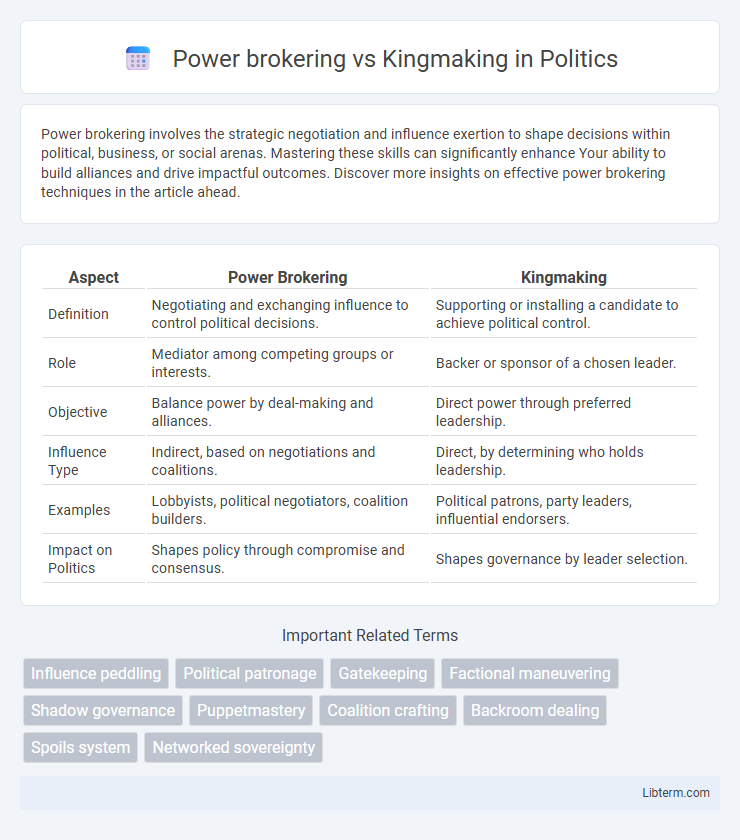Power brokering involves the strategic negotiation and influence exertion to shape decisions within political, business, or social arenas. Mastering these skills can significantly enhance Your ability to build alliances and drive impactful outcomes. Discover more insights on effective power brokering techniques in the article ahead.
Table of Comparison
| Aspect | Power Brokering | Kingmaking |
|---|---|---|
| Definition | Negotiating and exchanging influence to control political decisions. | Supporting or installing a candidate to achieve political control. |
| Role | Mediator among competing groups or interests. | Backer or sponsor of a chosen leader. |
| Objective | Balance power by deal-making and alliances. | Direct power through preferred leadership. |
| Influence Type | Indirect, based on negotiations and coalitions. | Direct, by determining who holds leadership. |
| Examples | Lobbyists, political negotiators, coalition builders. | Political patrons, party leaders, influential endorsers. |
| Impact on Politics | Shapes policy through compromise and consensus. | Shapes governance by leader selection. |
Understanding Power Brokering: Definition and Key Traits
Power brokering involves strategically influencing decisions and outcomes by leveraging relationships, resources, and information to shape agendas without holding formal authority. Key traits of power brokers include exceptional negotiation skills, deep networks across political or corporate sectors, and the ability to remain behind the scenes while orchestrating pivotal deals. Their influence is characterized by subtlety, discretion, and the capacity to align diverse interests toward a specific goal.
What is Kingmaking? Origins and Modern Context
Kingmaking refers to the act of influencing or determining who ascends to power without seeking the throne oneself, a concept originating from medieval political strategies where influential nobles or advisors decided monarchs' fates. In the modern context, kingmaking manifests in political, corporate, and social arenas where individuals or groups leverage their power to install leaders that align with their interests, often operating behind the scenes. This role contrasts with power brokering, which involves negotiating and distributing power more broadly rather than solely controlling leadership succession.
The Fundamental Differences: Power Brokering vs Kingmaking
Power brokering involves the strategic negotiation and exchange of influence to achieve specific political or organizational outcomes, emphasizing transactional relationships and resource control. Kingmaking, by contrast, centers on shaping leadership choices through endorsement or manipulation, often elevating a candidate or figurehead to prominence without direct governance. The fundamental difference lies in power brokering's focus on leveraging influence for mutually beneficial deals, whereas kingmaking revolves around controlling succession and authority by determining who holds power.
Historical Examples of Power Brokers
Power brokering involves influential figures who manipulate political or economic outcomes behind the scenes, exemplified by historical figures like Cardinal Richelieu, who orchestrated France's internal and external policies during the 17th century. Kingmaking refers to individuals or groups who directly influence or decide the succession of rulers, as seen with the role of the Electors in the Holy Roman Empire selecting emperors. Power brokers often shape policies and alliances without holding official titles, whereas kingmakers wield decisive authority in monarchial or political successions.
Notable Kingmakers in History
Notable kingmakers in history have shaped political landscapes by influencing or deciding leadership outcomes without holding formal power themselves, exemplified by figures such as Cardinal Richelieu in 17th-century France and the Earl of Warwick during England's Wars of the Roses. These kingmakers leveraged strategic alliances, manipulation, and support to elevate rulers favorable to their interests, contrasting power brokering where direct negotiation and resource exchange dominate. Their impact often extended beyond immediate political gains, altering dynastic successions and national histories through behind-the-scenes influence.
Techniques and Tactics Used by Power Brokers
Power brokers utilize negotiation, alliance-building, and strategic information control to influence political or business outcomes behind the scenes. Mastery of discreet persuasion and access to critical networks allows them to shape decisions without holding official titles. Their tactics often include leveraging insider knowledge, orchestrating deals, and managing stakeholders to consolidate influence effectively.
Kingmaking Strategies: How Influence Shapes Outcomes
Kingmaking strategies revolve around leveraging relationships, resources, and strategic positioning to elevate preferred candidates or outcomes without direct authority, demonstrating influence through subtle control and coalition-building. These strategies often include orchestrating alliances, manipulating perceptions, and controlling key information to shape decision-making processes within political or organizational environments. Effective kingmakers utilize a deep understanding of power dynamics, social networks, and timing to mold outcomes favorably while maintaining an appearance of neutrality.
Impact on Politics: Power Brokers Versus Kingmakers
Power brokering impacts politics by strategically influencing decision-making and resource allocation to shape policy outcomes behind the scenes. Kingmakers exert a more direct political influence by determining leadership succession and installing preferred candidates, altering power dynamics at the highest levels of government. Both roles play crucial but distinct parts in political ecosystems; power brokers navigate alliances and negotiations, while kingmakers decide who holds ultimate authority.
The Ethical Implications of Power Brokering and Kingmaking
Power brokering involves the strategic distribution of influence to shape political or organizational outcomes, often raising concerns about transparency and accountability. Kingmaking, the act of installing or supporting leaders behind the scenes, poses ethical dilemmas surrounding manipulation and the undermining of democratic processes. Both practices challenge principles of fairness and consent, risking concentration of power in unaccountable hands.
Which Has Greater Influence? Assessing Power Brokers vs Kingmakers
Power brokers wield substantial influence by directly controlling resources, decision-making channels, and political or business networks that shape policy and market outcomes. Kingmakers exert a more indirect but profound influence by shaping leadership selection, appointing key figures, and setting the strategic direction behind the scenes. While power brokers affect immediate operational control, kingmakers determine the overarching power structure, making their influence often more enduring and transformative in political and organizational hierarchies.
Power brokering Infographic

 libterm.com
libterm.com